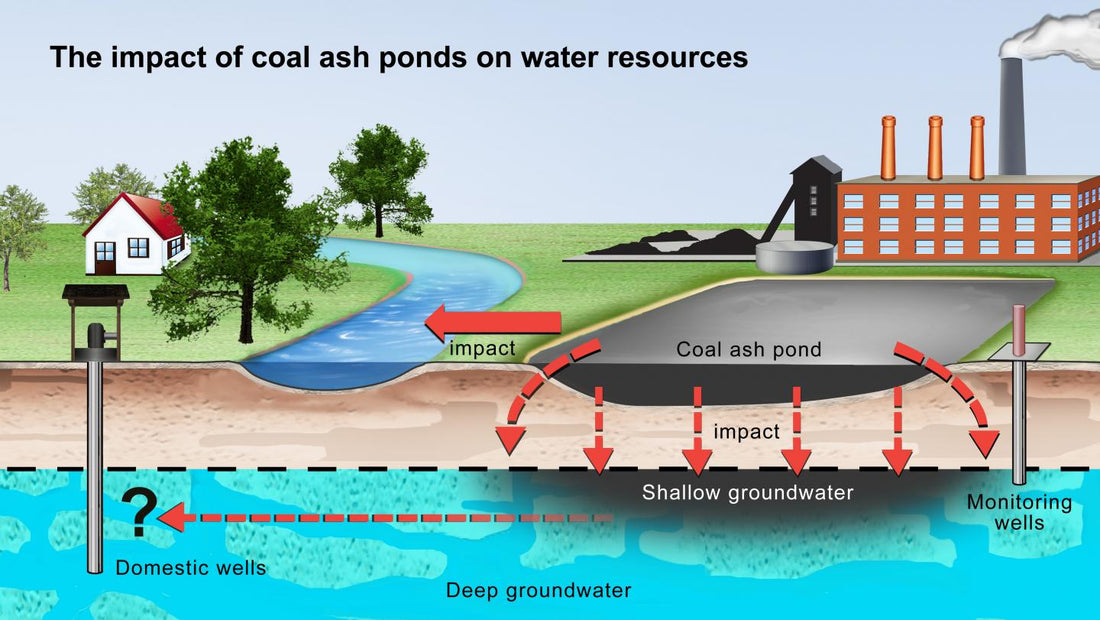
Coal Ash Ponds Leak Long-lasting Toxic Substances
By Dan DeBaunShare
A recent study of unlined coal ash ponds sited near twenty-one power stations across five south eastern states in the US has found that they leak toxins that consistently contaminate nearby groundwater and surface freshwater systems with long-lasting effects.
Researchers from Duke University found high concentrations of heavy metal contaminants, including selenium and arsenic, in freshwater samples taken from all the test sites. In 29% of the water samples concentrations of toxic trace elements were above the EPA safety standards set for both ecological health and drinking water.
"In all the investigated sites, we saw evidence of leaking," said co-author, Avner Vengosh, a professor of geochemistry and water quality in Duke University's Nicholas School of the Environment. "Some of the impacted water had high levels of contaminants.
The results of the study, which was recently published online in Environmental Science & Technology, do not include drinking water wells; however, according to Vengosh, these will be assessed in a follow-on study.
During 2015 the research team analyzed water samples taken from 39 surface water bodies together with coal ash pond seep samples from 7 different sites. In addition, they examined state records of water quality data recorded at 156 shallow wells dug to monitor groundwater quality adjacent to coal ash ponds at 14 power plants in North Carolina.
While shallow groundwater monitoring wells are generally only 30-50 feet deep and do not reach the same depth as most drinking water wells, which tend to be between 100-300 feet deep, according to Vengosh, these contaminants can still potentially leach to greater depths and contaminate drinking water wells.
The study shows that this contamination is not only widespread, but also the toxins tend to persist in the environment for a very long time. Many of the study sites are no longer in use and coal ash is no longer dumped there, yet surface water bodies, and even groundwater in one case, showed evidence of contamination.
"The degree to which leakage affects the concentration of toxins in nearby waters varies because of several factors, including the nature of the coal ash, processes in the pond and the flow through the local soil," said Jennie Harkness, a doctoral student at the Nicholas School and the lead author of the study.
While in certain cases coal ash ponds may legally release liquid effluent into surrounding surface water systems via regulated outlets, the data from this study show that effluent is also being released in ways that are not permitted, posing a threat to both aquatic ecosystems and drinking water resources.
The site with the highest levels of heavy metal contaminants present in shallow groundwater wells was located adjacent to a Tennessee ash disposal site that is no longer in use. Water samples showed that levels of iron, lead, zinc, cadmium, selenium and nickel exceeded safety standards set for drinking water quality and health of aquatic life. According to Vengosh, the study's findings show that even if these coal ash ponds were removed we would still be left with a legacy of groundwater contamination as a result of decades of leaking, which would require a mammoth effort to address.
Journal Reference
Jennifer Harkness, Barry Sulkin and Avner Vengosh. Evidence for Coal Ash Ponds Leaking in Southeastern United States. Environmental Science and Technology, (online June 10, 2016). DOI: 10.1021/acs.est.6b017276
-
Regular price $234.00 USDRegular priceUnit price / per
-
Regular price $327.00 USDRegular priceUnit price / per
-
Regular price From $367.00 USDRegular priceUnit price / per
-
Regular price From $408.00 USDRegular priceUnit price / per
-

 Sold outRegular price From $451.00 USDRegular priceUnit price / per
Sold outRegular price From $451.00 USDRegular priceUnit price / per -
Regular price From $478.00 USDRegular priceUnit price / per
-
Regular price $332.50 USDRegular priceUnit price / per
$350.00 USDSale price $332.50 USDSale

Dan DeBaun is the owner and operator of Big Berkey Water Filters. Prior to Berkey, Dan was an asset manager for a major telecommunications company. He graduated from Rutgers with an undergraduate degree in industrial engineering, followed by an MBA in finance from Rutgers as well. Dan enjoys biohacking, exercising, meditation, beach life, and spending time with family and friends.
~ The Owner of Big Berkey Water Filters
















